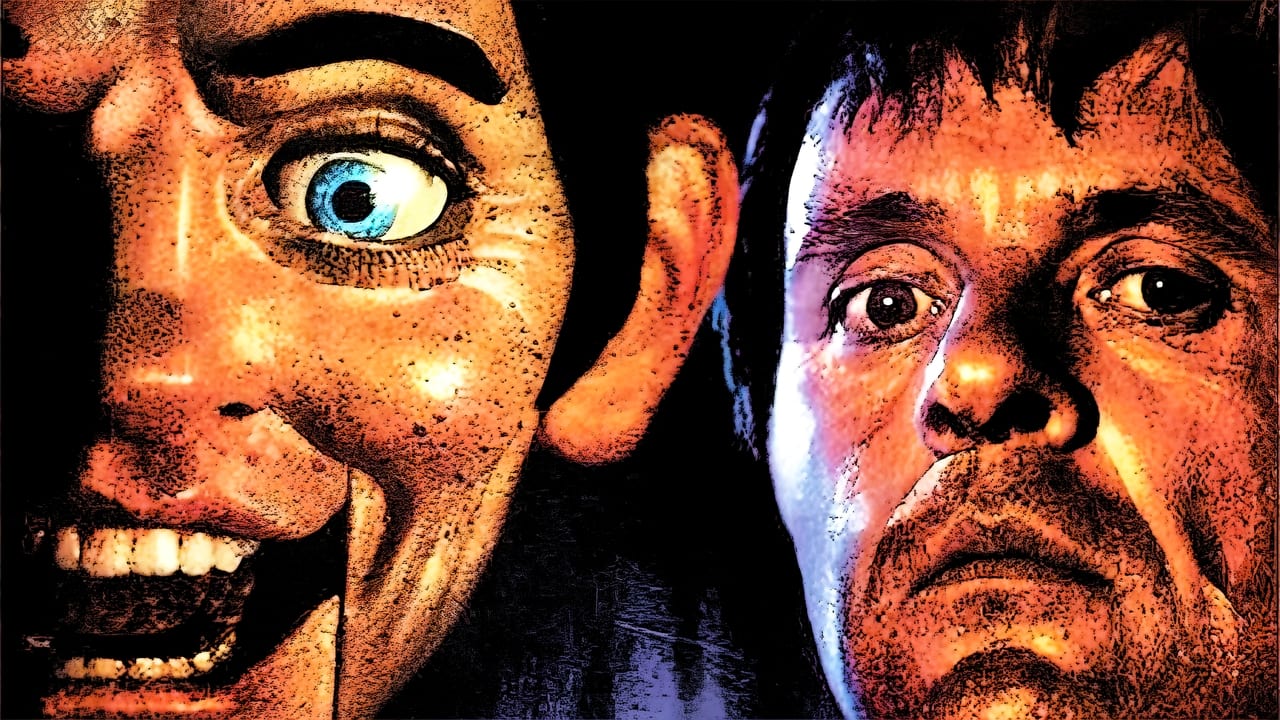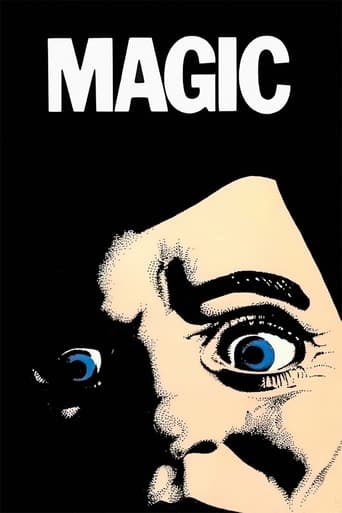

A ventriloquist (Anthony Hopkins) is at the mercy of his vicious dummy while he tries to renew a romance with his high school sweetheart (Ann Margret).Of course, this is Anthony Hopkins' film, doing some fine work with two voices. How much is actual ventriloquism and how much was recorded after, who knows? But he more or less carries this film himself. For those who think Hopkins was not big in the horror genre until "Silence of the Lambs", this film will change your mind. But let us not forget the supporting cast.Laurence Olivier was originally offered the role of the agent but was unable to do it so Burgess Meredith was cast instead. Meredith got the role after walking into 21 one night when Joe E. Levine was there - Levine cast him on the spot. Meredith modeled his performance on the agent Swifty Lazar, even shaving his head to look like Lazar. "I tried to get his cool, understated manner, his sharp clothes and, most of all, his way of speaking softly so that you've got to lean over to hear what he's saying," said Meredith. This may be one of his best roles ever, clearly playing the stereotypical agent.
... View MoreIn this bizarre classic, the late Richard Attenborough brings to life William Goldman's 1976 re-imagining of the 1929 film The Great Gabbo- where a ventriloquist suffers from dual personalities because of the nature of his trade. Shifting it from a romance to a horror (though there is still an element of romance).Anthony Hopkins puts on an incredible performance as Corky- a socially awkward magician whose act just isn't up to par. That is, until he comes up with a schtick where he teams up with a ventriloquist dummy named Fats (whose voice is also done by Hopkins). Together, they put on a self-deprecating stand-up comedy routine, with some magic tied in, of course. .They are a hit...and on the brink of hitting the bigtime. Their agent has a lined the duo up with a pilot, and potential series to follow. But- with Fats as the dominant personality- Corky fears that he will blow his big chance- or have to face reality- and thus flees back to his childhood home, in search of his high school crush, Peggy.He finds her running her families old motel. Though it's failing, along with her marriage. While her husband is away, Corky takes up residence in one of the cabins, as he tries to woo her with Fats.But after a while, it becomes unclear whether Corky is suffering from some sort of split personality disorder, or whether he is actually reeling from the psychological effects related to the burden of covering up for the fact that Fats is, himself, animate.Not only is Fats animate, but he also seems to be able to manipulate Corky. It's clear that he prefers this route too. During the killing of Gangrene, Corky is the one acting at the behest of Fats. But when Corky successfully woos Peggy, he becomes liberated from his fear-of-failure complex, forcing Fats to lash out on his own- like when he attacks and kills Duke, Peggy's husband.You start to think that Corky and Fats are definitely two separate entities (with Fats having his own soul or what not), but the ending blurs this distinction, and makes you re-evaluate what you thought you knew.I don't know if Hopkins was really doing the ventriloquism, or whether he was just acting it...but his performance is downright incredible either way. If only for the diverse range emotions and psychological conditions covered. As was previously mentioned, this film owes a lot to the 1929 film The Great Gabbo, and seems to have gone on to influence other films like Child's Play. Ventriloquist dummies are so badass, and make for solid psychological horror icons! This is one truly disturbing film that seems to be a sort of under-appreciated classic. A must see.8.5 out 10.
... View MoreA good 13 years before scaring the bejeebers out of audiences by portraying a certain fava-bean-and-human-flesh-eating cannibal, Welsh actor Anthony Hopkins was playing a demented wackadoodle really almost as frightening, in the 1978 film "Magic." As far as I can tell, "Magic" was the sixth film to deal with a ventriloquist and his relationship with an alter-ego dummy (not counting the 1954 Danny Kaye COMEDY "Knock on Wood"). Lon Chaney had starred in "The Unholy Three" in 1925 and in its remake of 1930; I would love to see both of these supposedly marvelous features one day. I CAN report that the Erich von Stroheim film "The Great Gabbo" (1929), an early talkie, is simply dreadful; surely one of the top 10 worst that I have seen at the NYC repertory house Film Forum, out of almost 1,300 movies that I've caught there over the years. The Michael Redgrave segment in the British film "Dead of Night" (1945) has been justly celebrated, but this represents just one short section among a half dozen others in this classic horror anthology. And then there is 1964's "Devil Doll," another British horror outing, and a truly freaky little gem that I do recommend highly. Still, despite the fine qualities of those last two pictures named, "Magic" just might be the finest film to wholly deal with the subject of a ventriloquist gradually going completely bonkers that this viewer has ever seen.In the film, Hopkins plays the part of Corky Withers, an absolute flop as a magician until he one day hits on the bright idea of incorporating a dummy into his act and becoming a ventriloquist. Flash forward a year, and Corky is poised on the brink of stardom, with a high-powered agent, Ben Greene (a most impressive, pleasingly underplayed performance from Burgess Meredith here), arranging an NBC pilot for him. But Corky panics when he learns of the physical exam that NBC wants him to undergo, and runs away with his dummy, Fats, to the small town in the Catskills where he grew up. There, he stays at a rented cabin on the shore of Lake Melody, run by the love of his youth, Peggy Ann Snow (the yummy Ann-Margret). But a surprise visit from Ben, the beginnings of a romance with Peggy, and the sudden arrival of Peggy's husband all contribute to a rapidly deteriorating mental state for Corky (and the jealous Fats), and before long, not one but two homicide victims are being dumped into the placid waters of Lake Melody....Despite the "Maltin Movie Guide"'s contention that "Magic" is a "ludicrous thriller," this viewer feels that the film is just dynamite, and mainly thanks to a trio of wonderful performances, some sterling directorial choices by Richard Attenborough, and a sparkling and terribly witty screenplay by William Goldman, based on his novel. Hopkins is absolutely fantastic in the lead; simply a marvel to behold as the schizophrenic Corky. Ann-Margret looks stunningly gorgeous here, at age 37, and invests her character (written expressly with the actress in mind) with both charm and pathos. And Burgess Meredith is just wonderful as the shrewd yet compassionate Ben Greene. In the film's single best scene, Ben walks into Corky's cabin while the ventriloquist and Fats are ranting at one another, and the look on Greene's face lets the audience know that he has finally become aware of the true depth of his client's sickness. Greene then challenges Corky to go just five minutes without talking through his dummy, in an extraordinarily suspenseful follow-up sequence. Of course, Corky is not able to do so, and the look of increasing discomfort on Hopkins' face, as the seconds tick by, is just priceless. And this is just one terrific scene out of dozens in this gripping tale of insanity. Other performances to single out include that of Jerry Houser--an actor whose name you might not recognize but whose face was all over 1970s TV--as a hilarious cabbie; Ed Lauter as Peggy's seemingly brutal but surprisingly sympathetic husband, Duke; and of course the always-fine David Ogden Stiers as an NBC executive. And then there is Fats himself (itself?), an alternately cute and frightening-looking creation who really does seem to be alive at certain points; his is hardly a, um, wooden performance! Unlike "Devil Doll," in which the dummy quite clearly has some kind of animate will of its own, in "Magic," the filmmakers are rigorously scrupulous in not allowing Fats to speak unless Corky is in the same room, and not allowing him to move unless Corky is within arm's reach. Thus, it is fairly clear that Corky himself is responsible for all the murder and madness on display. Still, the filmmakers do slip once, when Fats' eyes seem to move of their own volition; a truly startling moment, to be sure! In one of the many extras on the Dark Sky DVD that "Magic" currently appears on, Dennis Alwood--the consulting ventriloquist on the film--tells us that this was just "an accident," but one that the filmmakers decided to leave in. A deliberate blooper, one might call it, that fortunately serves to add even more freakiness--not to mention a tad of uncertainty--to the already outre proceedings.This Dennis Alwood interview, by the way, is a highly interesting one. In it, he reveals that the film was originally set to star Jack Nicholson, who dropped out because he didn't want to wear a hairpiece (!), and that Al Pacino, Gene Wilder and Chevy Chase were all considered for the lead, before Attenborough decided on Hopkins (who he had just directed the year before in "A Bridge Too Far"); he also mentions that Laurence Olivier was slated to play Ben Greene, until he got too sick and had to be replaced. The DVD is a generous package, apropos for a terrific little film. But really, Fats' comment regarding Peggy's backside looking as if it were "on ball bearings" is worth the price of admission alone!
... View MoreLong before he taught us how to make liver with a nice chianti, Anthony Hopkins starred in this maudlin thriller about a down-on-his-luck magician who finally makes it big with his magic card trick when he adds an X-Rated dummy into the mix. No, the dummy is not a politician with marital problems, but a Charlie McCarthy/Chuckie-like doll with a foul mouth who can turn into Linda Blair's "The Exorcist" character by turning its head totally around and all sorts of other creepy things that make you wonder why people want to become ventriloquists in the first place. Hopkins, it seems, was a shy sort of fellow who suddenly makes it big, and when he decides he can't handle the fame anymore, he returns to his old neighborhood where he rents a cottage from an old high school classmate (the gorgeous Ann-Margret) who has always had a crush on him and loves "Fatty", the name of his creepy looking doll. But putting the doll down and becoming comfortable in his own shoes isn't something Hopkins can do, and he becomes "possessed" by the personality of this doll whose image he lives through. Sort of an alternative to the "Cyrano de Bergerac" plot, "Magic" never becomes a horror movie, just a curiosity piece of what will happen when Hopkins' transformation is completely done into this growing murderous creature, especially when Ms. Margret's estranged husband re-appears on the scene.Anthony Hopkins had a career that hadn't truly sprung into super stardom yet. After his role in the 1968 film version of "The Lion in Winter", he drifted between mostly forgettable movies and some stage work, getting critical acclaim for this film that the same critics who praised him for it had panned. He truly is amazing, his theatrical voice really ringing in your ears, much like Richard Burton's. The presence of Ann-Margret as well as Burgess Meredith and David Ogden Stiers in supporting roles pale in comparison to the presence of this star.
... View More